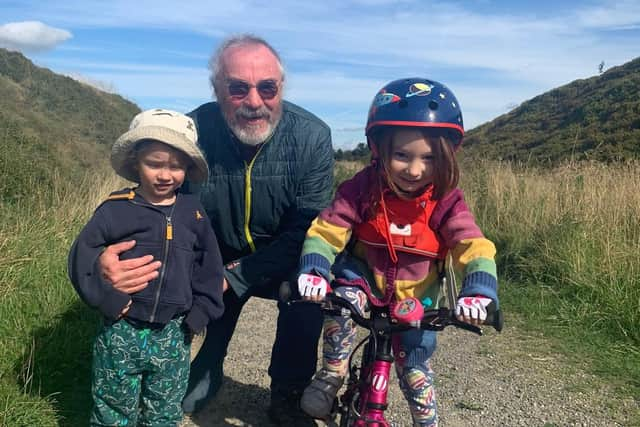Buxton grandad begins New Year cancer free after pioneering genetic treatment
and live on Freeview channel 276
Retired IT worker Robin Edwards, 66, is now free of chronic lymphocytic leukaemia (CLL) thanks to a clinical trial run by the Christie NHS Foundation Trust in Manchester, researchers at University College London (UCL) and the company Autolus Therapeutics.
First diagnosed in 2012, Robin was initially treated with standard chemotherapy, then another trial took him into remission for four years, only for the disease to return in 2021.
Advertisement
Hide AdAdvertisement
Hide AdIn May 2022, he was admitted for 30-days at the Christie to undergo the new CAR-T therapy and his latest check-up confirmed he is now in complete remission with no signs of cancer.


Robin said: “I didn’t think CAR-T was on the cards for a patient like me, but thanks to the clinical trial I now have no detectable disease which is fantastic.
“I feel confident and relaxed at the Christie, totally trusting the excellent team who support me. They wanted to treat my CLL early before we got on the back foot and remedial action was needed.”
The treatment begins by collecting a patient’s own white blood cells – specifically the T-cells responsible for fighting infection – then genetically modifying them in a laboratory so they can recognise and ‘fight’ cancer cells once infused back into the patient.
Advertisement
Hide AdThe therapy has been available in the UK since 2018 but is currently only licensed for treatment of a small number of aggressive blood cancers.
Advertisement
Hide AdCLL is the most common type of leukaemia, with around 3,800 patients diagnosed in the UK every year. Most will experience relatively asymptomatic disease at first, but will ultimately require treatment.
The ALLCAR19 trial which Robin took part in is investigating the effects of modifying T-cells to produce a particular artificial protein – the chimeric antigen receptor (CAR) which detects cancer cells – called obecabtagene autoleucel or obe-cel.
The last decade has seen considerable progress in CLL therapies but new approaches are still needed for hard-to-treat cases and especially those patients who suffer a relapse.
Advertisement
Hide AdDesigners at UCL hope obe-cel can improve on earlier CAR T-cell therapies by reducing the risk of a toxic reaction called cytokine release syndrome and enabling the T-cells to persist in a patient’s body.
Professor Adrian Bloor, consultant haematologist at the Christie, said: “Whilst CAR-T therapy has become established as a standard treatment for some blood cancers, it is uncertain how effective this is for CLL. Robin is the first CLL patient treated with CAR-T therapy at the Christie and one of just a handful who have received this treatment for CLL in the UK.
Advertisement
Hide Ad“He has had a terrific response and currently completely clear of the disease, but it is still early days and we will need more follow up to assess how effective this is in the longer term. This is a pioneering treatment and hopefully has the potential to transform the outlook for patients with CLL that doesn’t respond to conventional treatment.”
Any patients interested in taking part in clinical trials should discuss their options with their consultant or GP as eligibility and outcomes will vary from case to case.